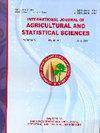Determinants of Blockchain Technology Adoption in Agricultural Supply Chain
IF 0.1
Q4 AGRICULTURE, MULTIDISCIPLINARY
International Journal of Agricultural and Statistical Sciences
Pub Date : 2024-06-01
DOI:10.59467/ijass.2024.20.211
引用次数: 0
Abstract
Blockchain technology adoption in agriculture can bring a win-win situation for all stakeholders in supply chain, which aids in the security of transactions and information in both forward and backward linkages in agricultural supply chain. Furthermore, blockchain platform benefits producers by enhancing their reputation, increasing their competitiveness and reducing fraud by eliminating undesirable practices in the supply chain. This research paper aims to analyze the determinants of blockchain technology adoption in agricultural supply chain. Grey relational analysis is employed to identify the determinant factors of blockchain technology adoption in the supply chain. The factors for blockchain technology adoption in supply chain are identified based on the literature review collected and focus group discussion with experts. Experts are insisted to rate the factors based on the five point likert scale. The findings revealed that data transparency, traceability, interoperability, data immutability and high value pricing, product type, organization trust, and government support can influence the blockchain adoption in supply chain. The findings conclude that priorities must be given to those influential factors which will help the organizational stakeholders in formulating suitable strategy for effectively implementing blockchain technology in the agricultural supply chain.. KEYWORDS :Blockchain technology, Adoption, Factors, Agricultural supply chain, Grey relational analysis.农业供应链采用区块链技术的决定因素
在农业领域采用区块链技术可以为供应链中的所有利益相关者带来双赢局面,有助于保障农业供应链前向和后向环节中的交易和信息安全。此外,区块链平台还能提高生产者的声誉,增强其竞争力,并通过消除供应链中的不良行为减少欺诈行为,从而使生产者受益。本文旨在分析农业供应链采用区块链技术的决定因素。本文采用灰色关系分析法来确定供应链中采用区块链技术的决定因素。根据收集的文献综述和与专家进行的焦点小组讨论,确定了供应链中采用区块链技术的因素。专家们坚持根据五点李克特量表对这些因素进行评分。研究结果表明,数据透明度、可追溯性、互操作性、数据不变性和高价值定价、产品类型、组织信任和政府支持会影响供应链对区块链的采用。研究结果认为,必须优先考虑这些影响因素,这将有助于组织利益相关者制定合适的战略,在农业供应链中有效实施区块链技术。关键词:区块链技术;采用;因素;农业供应链;灰色关系分析。
本文章由计算机程序翻译,如有差异,请以英文原文为准。
求助全文
约1分钟内获得全文
求助全文
来源期刊
自引率
66.70%
发文量
4
期刊介绍:
Information not localized

 求助内容:
求助内容: 应助结果提醒方式:
应助结果提醒方式:


